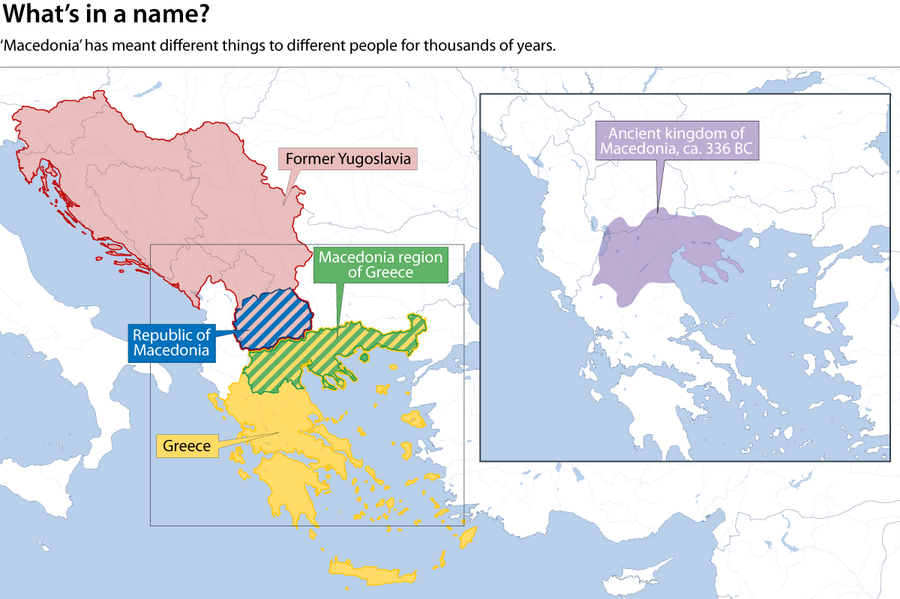Macedonians vote on their country's name. Will they follow heart or head?
Loading...
| SKOPJE, Macedonia
The country officially named the Former Yugoslav Republic of Macedonia, known as Macedonia to its inhabitants and most of the world, is set for the most important vote in its short history. This Sunday, a referendum will decide whether to ditch its wordy official name for the more concise “North Macedonia.” It may seem inconsequential to outsiders. But for proponents of the move, it is the key to unlocking access to the European Union and NATO – long inaccessible due to Greece’s objections to the Macedonia moniker. Athens has long vetoed Macedonian attempts to enter the two blocs because of concerns that the name was claiming Hellenic heritage, and too similar to that of Greece’s own northern region, also called Macedonia. Opponents of the renaming see the change as a surrender of national identity and heritage that the country has full, legitimate claim to. Even the country’s president has entered the debate, saying at this week’s United Nations General Assembly that the name change is “historical suicide.” But the referendum is expected to pass. “We are a small country but a proud one,” says Stefan, a student in the capital. “We will still be Macedonians.”
Why We Wrote This
Macedonia is facing an unusual manifestation of a common issue in today's world: Should a nation do what feels best, or what provides the best opportunity for its people?
His giant sword glinting in the autumn sunshine, a statue of Alexander the Great sitting astride a rearing stallion dominates the center of Skopje, the pint-sized capital of Macedonia. The warrior king looks down on a panoply of neoclassical museums, government buildings, and shining white bridges lined with bronze statues of ancient Macedonian heroes.
It is a display of muscular nationalism, built in the last decade, that has long antagonized Greece, Macedonia’s southern neighbor, which claims Alexander and many of the other historical figures as its own. For the Greeks, ancient Macedonia was Hellenistic and any attempt to muscle in on its past glories is cultural appropriation by modern-day Macedonians, most of whom are Slavs.
But this tiny Balkan nation of 2 million people, which is smaller than Maryland, now has a chance to move away from decades of confrontation with its neighbor. In the most important vote in the short history of the former Yugoslav republic, which became independent in 1991, Macedonians will vote in a referendum on Sunday to change the name of their country to North Macedonia.
Why We Wrote This
Macedonia is facing an unusual manifestation of a common issue in today's world: Should a nation do what feels best, or what provides the best opportunity for its people?
It may seem inconsequential to outsiders, but it is not. It is the key to unlocking one of Europe’s most intractable diplomatic disputes, which has dragged on for the last 27 years. But for many Macedonians, particularly members of the Slavic majority, the change – driven largely by outside pressure – could also mean eating away at the country’s national identity.
The nub of the issue is this: Since its creation from the remains of Yugoslavia in 1991, the country officially named the Former Yugoslav Republic of Macedonia, or FYROM for short, has been called Macedonia by its inhabitants, as well as most of the world.
But its neighbor to the south, Greece, has long felt that the name Macedonia implies an irredentist territorial claim on its own most northerly region, also called Macedonia. As a result, Greece has refused to acknowledge the country of Macedonia by that name. More significantly, Athens has long vetoed Macedonia from joining NATO and the EU.
But in the deal in June between Athens and Skopje, Athens will lift its veto in exchange for FYROM being officially renamed to North Macedonia. That would open the door to many new opportunities for Macedonia.
“For Macedonians, this is a chance for a reset and a move into the European-Atlantic community” at a time of expanding Russian influence in the Balkans, says Heather Conley, director of the Europe program at the Center for Strategic and International Studies think tank in Washington. “They also see it as an opportunity for economic renewal.”
But others are furious that Macedonia is being asked to change its name under what they see as pressure from the Greeks. They say that modern-day Macedonia was part of the ancient Macedonian empire and that they have every right to claim Alexander the Great, his father Philip II, and all the other heroes as part of their heritage.
Changing the country’s name would be a “generational sin,” they say, and have mobilized what they call “a mass citizen rebellion against the legitimization of historical treason through an illegal power grab and referendum fraud.”
Even Macedonia’s president is against the deal. Addressing the UN General Assembly in New York this week, Gjorge Ivanov said that the proposed name change would be a “flagrant violation of sovereignty” and “historical suicide.”
Opponents of the name change are calling for a boycott of the vote so that turnout is lower than 50 percent, which would diminish its legitimacy. But the most recent polls suggest around 57 percent of Macedonians will cast a vote in the referendum, with the majority of them saying they will opt to accept the name change deal.
Demographics play a significant role in the likely outcome.
Macedonian identity has always been a fragile and shifting concept. The landlocked country is surrounded by four larger countries – Bulgaria, Albania, Serbia, and Greece – which at one time or another have made claims on its territory.
And like most Balkan countries, Macedonia is far from ethnically homogenous. Ethnic Albanians make up 25 percent of the population and they are largely in favor of voting yes. “They have less emotional attachment” to the name Macedonia, Talat Xhaferi, the speaker of parliament and a major proponent of the name change, explains. The Slavic majority is more divided on the issue, as they have deeper ties to the name Macedonia.
“On Sunday, this generation is confronted with the choice of succumbing to the historical challenge, falling on its knees, folding its spine, and giving up its own identity,” said Igor Janusev, a leading member of the conservative opposition party VMRO-DPMNE. "Or to continue to fight and proudly transmit to future generations an example of how to keep what is yours.”
But the potential for a better life seems worth the tradeoff, others say.
Many are motivated by hopes that membership of the EU – even though it could take years to come about – could help lift an economy in which the average monthly wage is currently just 300 euros.
“I’ll vote yes. The economic situation in Macedonia is not good. We need a better future,” says Iso Musli, who works in his uncle’s souvenir shop in Skopje’s old Ottoman bazaar, a tangle of cobbled streets, tea houses, mosques, minarets, and hammams. “For me, changing the name of the country is a small thing. It’s not a problem.”
Even some who are proud of the Macedonian nationalism on display in Skopje are in favor. “We are a small country but a proud one,” says Stefan, a student in the capital. He is thoroughly admiring of the grandiose statues and monuments that have sprung up – “they’re awesome,” he says – but he cautiously supports the name change deal, too. “We will still be Macedonians.”










